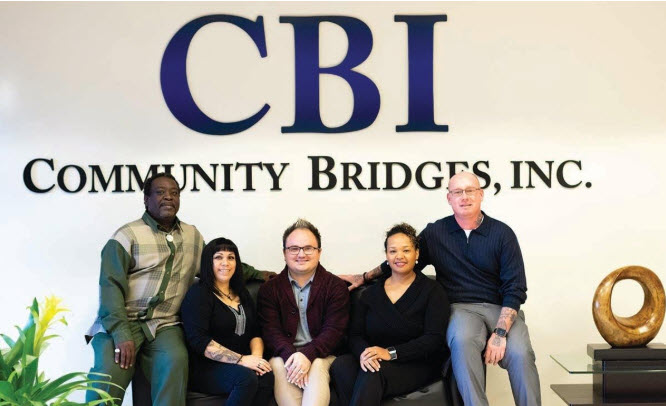This is the story of five different individuals from diverse backgrounds that all found recovery through believing in themselves. Each story celebrates one unique person that is devoting their career...
This is the story of five different individuals from diverse backgrounds that all found recovery through believing in themselves. Each story celebrates one unique person that is devoting their career to helping others find recovery by restoring the belief in themselves. Together these five stories represent the hundreds of people that found their recovery with the support of one of these inspirational Community Bridges, Inc. (CBI) employees.

Left to right – Rodney Reed, Tanya Alegria, Michael Specker, Ulonda Old Coyote, Zachary Tomlinson
“Alcohol and drug addiction
do not discriminate, it affects everybody regardless of the color of your skin, social and economic
background, sexual orientation or religious beliefs.”
Ulonda Old Coyote’s Story
My mother is Dine’ (Mexican Clan) and my father is African American and Apache. I was raised by my Maternal Grandmother and Grandfather in Sand Springs, Arizona that is in the Navajo Nation. I lived the first five years of my life on the reservation with my grandparents before I moved to Flagstaff, Arizona with my mother. I remember the transition was hard for me because I only spoke Navajo, and the only parental figures I knew were my grandparents.
Over the course of my life I had some significant identity issues, one of them was finding out that I was mixed and different from the rest of my family. My biological father was not in the picture, therefore, all I knew was my Native American heritage and ways of life. Throughout my life I tried to fit into many other groups but never quite fit in. This became a significant struggle for me for many years causing me to turn to drugs and alcohol to cope with the feelings that came along with the confusion.
Over the years that I spent running from myself, I never lost sight of where I came from and where my home was. The words of my grandfather stayed with me and reminded me that this road I was on was not our way of life. I was raised to be a caring person who loved and respected our people and our environment. That piece of my upbringing was never lost, but I needed to experience a different path to find who I really am. My skin color and my American Indian nationality were not who I was, but instead was a way to describe the history of where my people had been. I spent sixteen years in active and destructive addiction before learning that I was beautiful inside and outside.
Today, I am a Recovered Addict with 10 years of clean time. Everything that I learned along the way has added to the person that my Grandparents raised me to be. It took all those years that I spent living in addiction to learn that my ancestors intended for us to live a way that is respectful, kind and compassionate. The life of an addict is painful and full of turmoil, but we learn how to survive by numbing the struggle, and temporarily pushing aside the pain to simply try to get by each day. So many of us get lost in the journey of life and do not have the support to find our way home. Today I get the honor of being a beacon of light that helps shine the way, showing other struggling women that they are important.
Tanya Alegria’s Story
I am originally from Los Angeles, California. At an early age, I was exposed to a culture that consisted of addiction, poverty and gang violence. My mother was an addict, along with my two siblings and we experienced abuse, neglect and homelessness. In my early teens I left my mother and siblings to escape the events taking place at home. Without the support of family as a youth, I spent time surviving the violence and my addiction on the streets of Los Angeles. At the age of 18 I was five months pregnant, my son’s father was gunned down and I was alone and homeless once again. I couch surfed between various homes within my street gang and staying on the streets. I spent the next 11 years in affiliation with my gang and struggling with my substance abuse. By the time I was 30, I had four kids, I was a single mother, Homeless and still addicted to drugs.
In 2005, I was offered the chance of a lifetime, to get out of where I was and onto a scary path of unknown possibilities. I hopped on a Greyhound bus headed to Phoenix at 1am in the morning with 4 children and pregnant with #5. I wound up in the small-town of Young with cowboys and cowgirls who poured hope, faith, kindness, support and encouragement into my empty cup. It was there that I began a lifetime journey into recovery, healing and becoming the mother I dreamed I could be. After several years of sobriety and healing, I was ready to get out in the world and share the hope and inspiration the people in that small town shared with me. I wanted to make a difference in the lives of others.
I have been in the behavioral health field for 10 years working with various vulnerable populations from at risk youth to adults who are homeless and struggling with mental health and addiction. In 2016 I would find the agency that would allow me to serve clients in a way that aligned with what I stand for and believe in; that it is our duty and responsibility to come to the aide of those in need while upholding their rights with respect and dignity. I started at CBI’s Center for Hope, where women who were experiencing addiction and homelessness could truly find hope and refuge. Center for Hope allows women in recovery to help women coming into recovery rebuild their lives, become the mothers they want to be, heal from their brokenness, find their voice and use recovery skills to improve their lives and the lives of their children. I now work with the PATH program that serves to outreach those who suffer in silence on the streets of Maricopa County. Working at CBI I have come to know people of various backgrounds, all working together for one cause in their own unique way.
Michael Specker’s Story
I am a 32-year-old gay addict that has been fortunate enough to have found acceptance in recovery. My journey is not like most. I came from a family that did not struggle and I always felt loved at home. It wasn’t until I was a young adult that I went down a different path and started to feel ashamed of myself and the choices I made. I used for about 5 years and lost almost everything dear to me. When I entered recovery, I found solace in the rooms of Narcotics Anonymous and my recovery home is the Phoenix Shanti Group. Even though I struggled with feeling worthy of getting clean and living a life of recovery, I did what was suggested and learned about myself. I learned that because I have a story different from others and that I have survived so much, I am worthy of a life in recovery and worthy of providing support to others. I have found my calling in helping others and sharing the diversity of recovery that has been shared with me. I am so grateful that my journey has given me the opportunity to help others and share the gift that was so freely given to me. I am honored to share with others the hope that was instilled in me and show that recovery is not easy, but it is worth all the work that is put into the journey. I live by the motto “I know I have another relapse in me, but I don’t know that I have another recovery in me.” I am now 7 years clean and sober, I am engaged to be married, I have joined in the care of family and am a father figure to a nephew. My life is so full and happy thanks to recovery. I value the diversity within the Recovery Community and in the community, I work in.
Rodney Reed’s Story
As a young boy I learned that hard work pays off. Unlike the other youth in my neighborhood I would spend my evenings after school pulling weeds and doing chores for the neighborhood elderly. This act would eventually instill in me work ethics that would last a lifetime. I was plagued by the color of my teeth, inadequate clothing and low self-esteem that began to foster negative feelings within me. These feelings would eventually develop an inner being that employed shame, anger and discontentment creating the foundation of an addict.
I utilized crack cocaine from the age of 25 to the age of 32. Like most addicts, I was in denial of my problem. Society had made of mockery of me since birth because I was judged for my appearance and not judged for the person I was on the inside. So much was taken from me and so little was given to me. My belief was that the world owed me, and I vowed to make as many people as miserable as I was even if it meant destroying myself.
On October 24th, 2002, I sat in the back of a police car being arrested for burglary. I welcomed the arrest on October 24th. I was tired and wanted a new beginning and did not have the drive to do it alone and the night before the arrest I had prayed for the opportunity of an arrest. I welcomed prison because I wanted to live.
While in prison, I came across a book entitled Healing the Child Within by Charles Whitfield. In reading this masterpiece a child was relinquished from imprisonment and a man was born. I would soon learn that I need not to be ashamed of the person I was or my path. I would take what was good and learn from what was bad and build the man I wanted to become. It was at this point that I fell in love with the art of behavioral health.
In February 2012, I would find my calling. This was the day that I was so graciously allowed to become an employee of CBI. Having the opportunity to work for CBI has had its highs and lows. I have been afforded the opportunity to learn so much about myself while having the golden opportunity to help others. I have come to understand that if you foster negative feelings you are more likely to have a negative outcome. During my employment, I have submitted for internal job opportunities and was denied the opportunity for advancements. The damaged child in me began to respond to the rejection and it was then that I realized it was time to revisit Healing the Child Within. In doing so, I examined my personal appearance only to discover that my shoulder length hair fostered the feeling that I was a superior being. I had allowed my appearance to become a person that fostered a negative work environment. While my demeanor provided appropriate services to clients, I was withdrawn from interacting with other staff. I was self-taught and did not want the input of my co-workers. So, I decided to cut my hair. In doing so I became weak. My weakness allowed me the opportunity to reach out to others for assistance. It is now my belief that many of the barriers that we experience in life we place on ourselves. While culture and spiritual barriers do exist – the biggest barrier on us is the barriers that we build. I have learned that barriers can be best described as challenges. Today I challenge myself to be better than I was yesterday. I challenge myself to live in Harmony with The Child Within.
Zachary Tomlinson’s Story
I am an alcoholic/addict, my sobriety date is 3/7/16 which has become the most important day of my life. I started drinking and using drugs at the age of 15 and by the time I was 30 I was drinking daily, using heroin, methamphetamine, Xanax, and anything else that would change how I felt just to get through the day. I had lost the power to choose whether I would drink and use that day, it was an absolute necessity and it was just as much a part of me as breathing air to stay alive. I come from a middle-class family with a loving mother and father, 3 siblings, and had everything in life that I could need and most of what I wanted and yet my life still led me down a very long and dark road.
From being homeless, going to jail, using and selling drugs, and drinking until oblivion, I had resigned to the notion that I would die this way. This disease of alcohol and drug addiction doesn’t discriminate, it affects everybody regardless of the color of your skin, your social and economic background, sexual orientation or religious beliefs. My situation was no different, I became lost in the world of addiction which involved drinking every day, using and selling drugs, and ruining every meaningful relationship I had. I eventually landed in treatment at the age of 30 totally lost and broken. My desire to get sober was there, however, I still had a lingering desire to continue to drink and use. I eventually decided that the way of life that I wanted to live was that of recovery and my life has been forever changed as a result of that decision. Because of the nature of this disease and the fact that it is non-discriminatory, I look at each person afflicted as an equal and my sole purpose in life is to help another man or woman who is struggling.
There are many different cultures and walks of life in recovery and whether or not ours look different or the same, we are in this together and that mindset is what has stuck with me in order to help as many people as I can. I got into a career that has allowed me to further my purpose and allows me the opportunity to spread hope and light on a seemingly dark spot in the lives of those I serve. I am not perfect just because I walk a path of recovery; however, I do my best to live a life of altruism and to think of my fellowman above myself. Every good thing I have in my life is a direct result of helping other people and in that regard, I am blessed beyond measure. From where I was to where I am it seems like an unattainable dream, but it is the reality of my life today. Love more, hate less, help others, stay blessed! Thank you for my life. Thank you for all our lives.
Through struggle and determination, these individuals have fought for their lives and to give back what they have gained through their recovery journey. It’s a true testament to who they are as individuals, and it shows in the darkest of moments that there is hope and light at the end of the tunnel. Everybody’s recovery journey is different, and their backgrounds are diverse. Addiction does not discriminate. We need to continue to fight this fight and grow stronger together!
About Community Bridges, Inc.
Community Bridges, Inc. (CBI) uses a holistic—or integrated—approach to addiction treatment and behavioral health concerns. We take each person’s unique traits and issues into account to design a treatment plan. Using a combination of education, therapy, housing, medications, peer support, inspiration, hope, and other supportive services, our solutions are never one-size-fits-all. People are unique, and their treatment plan should be too.
For more information and to learn about our services please visit: communitybridgesAZ.org




























